Related Research Articles

The University of Chicago is a private research university in Chicago,Illinois,United States. Its main campus is in the Hyde Park neighborhood on Chicago's South Side,near the shore of Lake Michigan about 7 miles (11 km) from the Loop.
Kenneth T. Jackson is an urban,social,cultural historian,author,and academic. He is the Jacques Barzun Professor Emeritus of History at Columbia University,where he has also chaired the Department of History.
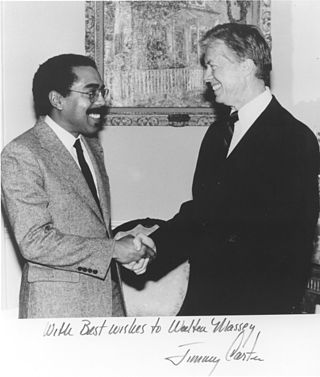
Walter Eugene Massey is an American educator,physicist,and executive. President Emeritus of both the School of the Art Institute of Chicago (SAIC),and of Morehouse College,he is chairman of the board overseeing construction of the Giant Magellan Telescope. During his long career,Massey has served as head of the National Science Foundation,director of Argonne National Laboratory (ANL),chairman of Bank of America,and as trustee chair of the City Colleges of Chicago. He has also served in professorial and administrative posts at the University of California,University of Chicago,Brown University,and the University of Illinois.
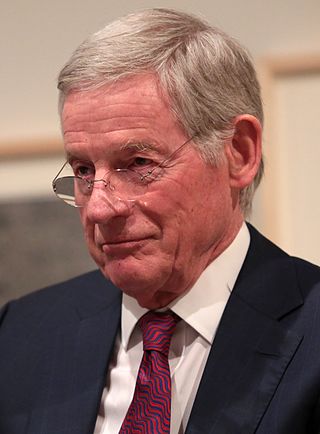
Harvey Claflin Mansfield Jr. is an American political philosopher. He was the William R. Kenan Jr. Professor of Government at Harvard University,where taught from 1962 until his retirement in 2023. He has held Guggenheim and NEH Fellowships and has been a Fellow at the National Humanities Center. In 2004,he was awarded the National Humanities Medal by President George W. Bush and delivered the Jefferson Lecture in 2007.
Jonathan Lear is an American philosopher and psychoanalyst. He is the John U. Nef Distinguished Service Professor in the Committee on Social Thought at the University of Chicago and served as the Roman Family Director of the Neubauer Collegium for Culture and Society from 2014 to 2022.
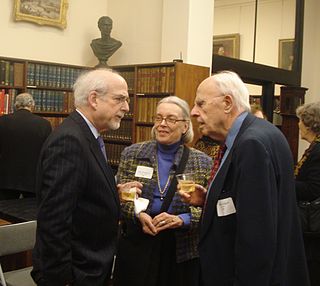
Bruce Milan Cole was a longtime professor of art history at Indiana University,a Senior Fellow at the Ethics and Public Policy Center in Washington,D.C.,a member of the Eisenhower Memorial Commission,and the eighth Chair of the National Endowment for the Humanities.
Alice Yaeger Kaplan is an American literary critic,translator,historian,and educator. She is Sterling Professor of French and former Director of the Whitney Humanities Center at Yale University.
Eloise Quiñones Keber was Professor Emeritus of Art History at Baruch College and The Graduate Center,CUNY,where she specialized in Pre-Columbian and early colonial Latin American art. She earned her Ph.D from Columbia University in 1984.
George Marshall Cohen was an American painter and art professor. He was a member of the Chicago-based Monster Roster group of artists and taught art at Northwestern University.
Christian Konrad Wedemeyer is an American scholar and political and social activist.
Norma M. Field is an author and emeritus professor of East Asian studies at the University of Chicago. She has taught Premodern Japanese Poetry and Prose,Premodern Japanese Language,and Gender Studies as relating to Japanese women.
John S. Strong is an American academic,who is the Charles A. Dana Professor Emeritus of Religious Studies at Bates College. Strong specializes in Buddhist studies and with emphasis on the Buddha's biography,relics,and the legends and cults of South Asia.
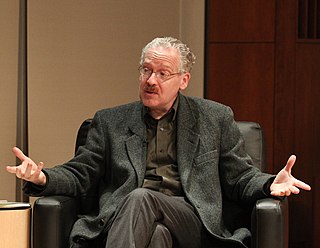
Lawrence M. Principe is the Drew Professor of the Humanities at Johns Hopkins University in the Department of History of Science and Technology and the Department of Chemistry. He is also currently the Director of the Charles Singleton Center for the Study of Premodern Europe,an interdisciplinary center for research at Johns Hopkins. He is the first recipient of the Francis Bacon Medal for significant contributions to the history of science. Principe's research has been supported by the National Science Foundation,the National Endowment for the Humanities,the American Philosophical Society,the Chemical Heritage Foundation,and a 2015-2016 Guggenheim Fellowship. Principe is recognized as one of the foremost experts in the history of alchemy.

David Maisel is an American photographer and visual artist whose works explore vestiges and remnants of civilizations both past and present. His work has been the subject of five major monographs,published by Nazraeli Press,Chronicle Books,and Steidl.

The College of Arts,Humanities and Social Sciences at the University of Maryland,Baltimore County (CAHSS) has 22 departments,and offers 30 Bachelor's,16 Master's,and 6 Ph.D. programs. The college also includes several scholarship programs;the Linehan Artist Scholars Program,the Humanities Scholars Program,and the Sondheim Public Affairs Scholars Program. The college oversees several centers;the Dresher Center for Humanities,the Imaging Research Center,and the Maryland Institute for Policy Analysis and Research.
Jeffrey A. Masten is an American academic specializing in Renaissance English literature and culture and the history of sexuality. He is the author and editor of numerous books and scholarly articles. Masten's book Queer Philologies was awarded the 2018 Elizabeth Dietz Prize for the best book in the field of early modern drama by the journal SEL:Studies in English Literature 1500–1900. He was named a Guggenheim Fellow in English Literature for 2022.
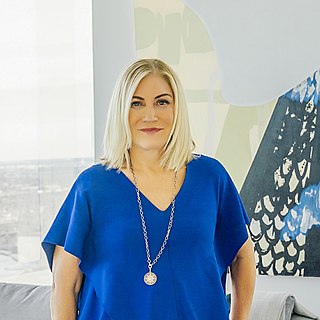
Suzanne Deal Booth is an American art director,collector,philanthropist,and vintner. She has worked as an arts advisor and is the Founder and the Director of Friends of Heritage Preservation (FOHP).
Andrea Blum is an American artist known primarily for her public artworks.
John W. Roberts is an academic who specialises in Folklore,African-American Studies and English Literature. His work has argued for the "integrity,authenticity,and authority" of African-American vernacular traditions.
John Louis Edwin Clubbe was an American academic. He was an emeritus professor of English at the University of Kentucky.
References
- 1 2 3 "Neil Harris | Department of Art History". arthistory.uchicago.edu. Retrieved 2022-06-16.
- 1 2 admin (2018-02-21). "Harris, Neil". Dictionary of Art Historians. Retrieved 2022-06-16.
- ↑ "Neil Harris". Workgroup for Public Policy Reform. Retrieved 2022-06-16.
- ↑ "Review: 'Capital Culture' by Neil Harris". Chicago Tribune. 13 October 2013. Retrieved 2022-06-16.
- ↑ Humanities, National Endowment for the (1974). Annual Report - National Endowment for the Humanities. National Endowment for the Humanities.
- ↑ "Nominations & Appointments, August 23, 1984". Ronald Reagan. Retrieved 2022-06-16.
- ↑ Resources, United States Congress Senate Committee on Labor and Human (1984). Nomination: Hearing Before the Committee on Labor and Human Resources, United States Senate, Ninety-eighth Congress, First Session, on Susan E. Phillips, of Virginia, to be Director, Institute of Museum Services, October 6, 1983. U.S. Government Printing Office.
- ↑ "National Museum Services Board Nomination of 15 Members of the Board. | The American Presidency Project". www.presidency.ucsb.edu. Retrieved 2022-06-16.
- ↑ "Neil Harris | History | The University of Chicago". history.uchicago.edu. Retrieved 2022-06-16.
- ↑ "Neil Harris". American Academy of Arts & Sciences. Retrieved 2022-06-16.
- ↑ "Neil Harris". John Simon Guggenheim Memorial Foundation. Retrieved 2022-06-16.